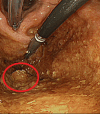A case report of an alcoholic with delirium tremens diagnosed with hypopharyngeal cancer: Psychiatrists played important roles in the smooth diagnosis and treatments
- PMID: 38868650
- PMCID: PMC11114356
- DOI: 10.1002/pcn5.54
A case report of an alcoholic with delirium tremens diagnosed with hypopharyngeal cancer: Psychiatrists played important roles in the smooth diagnosis and treatments
Abstract
Background: Alcohol use increases the risk of developing several types of cancer. Of these, hypopharyngeal cancer has one of the worst prognoses. Moreover, treating an alcoholic patient with hypopharyngeal cancer is often difficult. There are various treatments for hypopharyngeal cancer, including surgery, chemotherapy, and radiotherapy, depending on the state of the cancer and the patient's quality of life. Patients need physical, psychological, and social support in decision-making and post-treatment follow-up. This is especially true for alcoholic patients.
Case presentation: A 59-year-old man was admitted to our hospital with complaints of fatigue, loss of appetite, and tremor of the upper limbs. He was single, alcoholic, and had no family. After treatment for delirium tremens, he complained of throat pain. After endoscopy, magnetic resonance imaging, and examination with 18F-fluorodeoxyglucose positron emission tomography/computed tomography, he was diagnosed with Stage 4 A (T2 N2c M0) hypopharyngeal cancer. The psychiatrist and otolaryngologist discussed the patient's decision-making capacity and the various risks associated with treatment. Shared decision-making with the patient was considered most important in determining the treatment strategy. As a result, the patient decided to receive endoscopic laryngopharyngeal surgery in combination with lymphadenectomy, a challenging surgical treatment. The operation was successful, and the patient is now ready for a new life after discharge.
Conclusion: Psychiatrists have a significant role to play in the oncological treatment of patients with alcoholism and other psychiatric disorders.
Keywords: alcoholism; case report; delirium tremens; hypopharyngeal cancer; shared decision‐making.
© 2022 The Authors. Psychiatry and Clinical Neurosciences Reports published by John Wiley & Sons Australia, Ltd on behalf of Japanese Society of Psychiatry and Neurology.
Conflict of interest statement
The authors declare no conflict of interest.
Figures



Similar articles
-
Acute inferior ST-elevation myocardial infarction due to delirium tremens: a case report.J Med Case Rep. 2019 Oct 9;13(1):306. doi: 10.1186/s13256-019-2246-x. J Med Case Rep. 2019. PMID: 31597573 Free PMC article.
-
[Psychiatric manifestations of lupus erythematosus systemic and Sjogren's syndrome].Encephale. 2001 Nov-Dec;27(6):588-99. Encephale. 2001. PMID: 11865567 French.
-
A challenging case of lumbar vertebral burst fracture with alcohol withdrawal delirium: A case report.Medicine (Baltimore). 2023 Jan 20;102(3):e32712. doi: 10.1097/MD.0000000000032712. Medicine (Baltimore). 2023. PMID: 36701714 Free PMC article.
-
True hypopharyngeal carcinosarcoma: a case report and literature review.J Int Med Res. 2018 Aug;46(8):3446-3461. doi: 10.1177/0300060518779528. Epub 2018 Jul 12. J Int Med Res. 2018. PMID: 29996673 Free PMC article. Review.
-
Hypopharyngeal Reconstruction: Possibilities, Outcomes, and Updates for Improving the Human Health for Quality of Life.Comput Intell Neurosci. 2022 Feb 8;2022:6132481. doi: 10.1155/2022/6132481. eCollection 2022. Comput Intell Neurosci. 2022. PMID: 35178078 Free PMC article. Review.
References
-
- Wilson LF, Baade PD, Green AC, Jordan SJ, Kendall BJ, Neale RE, et al. The impact of reducing alcohol consumption in Australia: an estimate of the proportion of potentially avoidable cancers 2013–2037. Int J Cancer. 2019;145(11):2944–53. - PubMed
-
- Garneau JC, Bakst RL, Miles BA. Hypopharyngeal cancer: a state of the art review. Oral Oncol. 2018;86(November):244–50. - PubMed
-
- Teasdale G, Jennett B. Assessment of coma and impaired consciousness. A practical scale. Lancet. 1974;2:81–4. - PubMed
-
- Gao C, Qin C, Freeman S, Oskooee N, Hughes J. Two week wait referral criteria—heading in the right direction? J Laryngol Otol. 2019;133(8):704–12. - PubMed
Publication types
LinkOut - more resources
Full Text Sources
Research Materials
